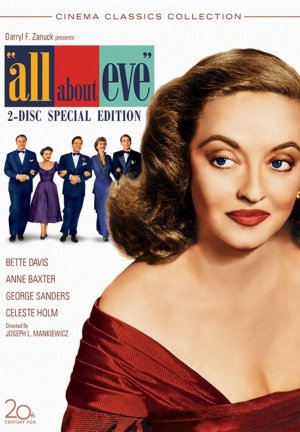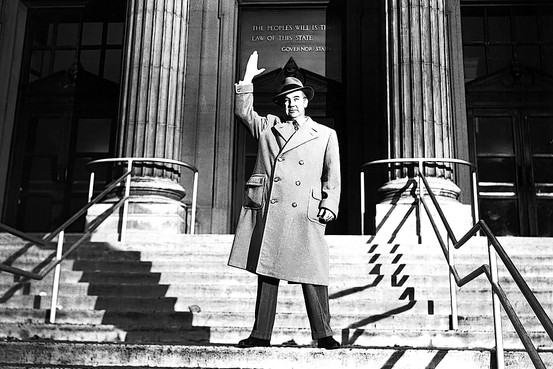My straight-to-the-point review of An American in Paris is
that it felt like a drag to sit through. I know that sounds like such a whiney
comment to make about an entire film. But if one can’t be honest on the pages
of their own blog, then where can one deposit an unvarnished opinion every now
and then? It’s not that I entirely disliked An American in Paris, not at all.
There were nuggets of entertainment here and there to enjoy. And it’s not that
I don’t enjoy or appreciate movie musicals. Au contraire haters, it’s a genre
that I relish more than all of the cheap relish in all the ball parks in
America. OK, I don’t relish them that much, but there’s relish, baby.
Directed by Vincente Minnelli, yes that would be Liza’s dad,
An American in Paris penciled eight Academy Award nominations on its dance
card, waltzing off with six wins, including Best Picture for 1951. It is the
second musical to win Oscar’s top offering, after The Broadway Melody, as well
as the second color motion picture to win, after Gone with the Wind. Produced
by MGM music man Arthur Freed, An American in Paris is considered part of a new
chapter of Hollywood musicals. Several pages of this chapter were written by
Freed and his colleagues at MGM, but throughout the 1950s and 1960s, other
studios produced melodic motion pictures that sang the right tunes on Oscar
night, making it the Golden Age for the movie musical, both literally and
figuratively.
 An American in Paris is a candy-coated jukebox musical
comedy centering on the romantic adventures of Jerry Mulligan, a WWII veteran
transplanted to Paris to follow his dreams of becoming the next Van Gogh.
Although Jerry’s artistic endeavors fail to attract public attention, his charm
and charisma do come to the attention of Milo Roberts, a bored and lonely socialite
who decides to finance Jerry’s career in hopes of inspiring a romantic pursuit.
Unfortunately for Milo, The Beatles had not yet made the scene, preventing her
from becoming the beneficiary of their musical wisdom that individuals cannot
purchase the affections of another. And despite her best efforts, Milo is left
to harvest the fruits of frustration as Jerry’s heart palpitates for Lise
Bouvier, a sweet perfume shop girl. Unbeknownst to the love struck Jerry,
however, is the fact that Lise is already involved with a Henri, a successful stage
performer, setting Lise on a path toward making the most difficult decision of
her life.
An American in Paris is a candy-coated jukebox musical
comedy centering on the romantic adventures of Jerry Mulligan, a WWII veteran
transplanted to Paris to follow his dreams of becoming the next Van Gogh.
Although Jerry’s artistic endeavors fail to attract public attention, his charm
and charisma do come to the attention of Milo Roberts, a bored and lonely socialite
who decides to finance Jerry’s career in hopes of inspiring a romantic pursuit.
Unfortunately for Milo, The Beatles had not yet made the scene, preventing her
from becoming the beneficiary of their musical wisdom that individuals cannot
purchase the affections of another. And despite her best efforts, Milo is left
to harvest the fruits of frustration as Jerry’s heart palpitates for Lise
Bouvier, a sweet perfume shop girl. Unbeknownst to the love struck Jerry,
however, is the fact that Lise is already involved with a Henri, a successful stage
performer, setting Lise on a path toward making the most difficult decision of
her life.  Perhaps the biggest problem with An American in Paris is
that it rests on such a paper-thin, underdeveloped plot that it isn’t able to
perform any emotional or dramatic heavy lifting. Instead of prospering to the
point of fostering a level of tension or dramatic dilemma worth investing in,
the film’s central relationships all provoke about as much zest as a container
of plain yogurt. Amazingly, the film took home the Oscar for Best Screenplay,
which is nothing short of shocking given that all of the musical numbers were
already existing Ira Gershwin compositions set to dance numbers that were
choreographed by Kelly. This begs the question: How much of what actually
appeared on screen in the end originated from the script? It seems like
Gershwin and Kelly should have also received at least a share of that Oscar for
their contributions to the screenplay’s success.
Perhaps the biggest problem with An American in Paris is
that it rests on such a paper-thin, underdeveloped plot that it isn’t able to
perform any emotional or dramatic heavy lifting. Instead of prospering to the
point of fostering a level of tension or dramatic dilemma worth investing in,
the film’s central relationships all provoke about as much zest as a container
of plain yogurt. Amazingly, the film took home the Oscar for Best Screenplay,
which is nothing short of shocking given that all of the musical numbers were
already existing Ira Gershwin compositions set to dance numbers that were
choreographed by Kelly. This begs the question: How much of what actually
appeared on screen in the end originated from the script? It seems like
Gershwin and Kelly should have also received at least a share of that Oscar for
their contributions to the screenplay’s success.
Apart from the lackluster screenplay, several other reasons
account for the bland trenches which An American in Paris finds itself wading
through. Perhaps the deepest one is the lack of any stellar or standout
performances from the principles players. Not that I’m familiar with Gene
Kelly’s entire cinematic oeuvre, but of all of his films that I have seen, he
rarely strays from the tried-and-true elements that made him an All-American star,
much like Bing Crosby. There is no denying that what Kelly does, he does it
well. But unfortunately, being an exceptional dancer does not translate into
strong acting. This fact is on full display in An American in Paris, as he
dances his way through a flat, forgettable performance that is borderline
annoying for its over indulgence in optimism and aww-shucksness.
 On equal footing with Kelly on this account is Leslie Caron.
An American in Paris marked her film debut, so one can dole out a measure of
forgiveness for any lack of acting experience that appears in her performance,
particularly as she proved a more capable actress in subsequent films. However,
in delivering her dialogue opposite Kelly, she does seem somewhat lost in her
navigations. In some scenes it felt as though she was just awkwardly repeating
lines, hoping they sound right, instead of saying them with ownership and
understanding. She appears to take refuge in one or two notes of her character,
leading her to play them over and over, putting her on a collision course to
becoming just another garden-variety love interest. It’s only when Caron is
dancing with Kelly that she appears confident and comfortable onscreen, making
it obvious that these two excel much more at communicating through dance than
through speech.
On equal footing with Kelly on this account is Leslie Caron.
An American in Paris marked her film debut, so one can dole out a measure of
forgiveness for any lack of acting experience that appears in her performance,
particularly as she proved a more capable actress in subsequent films. However,
in delivering her dialogue opposite Kelly, she does seem somewhat lost in her
navigations. In some scenes it felt as though she was just awkwardly repeating
lines, hoping they sound right, instead of saying them with ownership and
understanding. She appears to take refuge in one or two notes of her character,
leading her to play them over and over, putting her on a collision course to
becoming just another garden-variety love interest. It’s only when Caron is
dancing with Kelly that she appears confident and comfortable onscreen, making
it obvious that these two excel much more at communicating through dance than
through speech.
Despite her deficiencies as an actress, Caron still emerges
to be a delight to watch onscreen. Her angelic features, pixie cut and chic
French style add a touch of mink to every scene she appears in. Her features
seem like a fashion designer’s heaven-sent inspiration or an advertising
executive’s dream. And her beauty has a gravitational pull that injects the
screen with a certain je ne sais quoi quality that does pique one’s curiosity.
The one actor in the entire film that proved remotely
interesting was Nina Foch, who played the cool and nonchalant Milo Roberts. Her
sultry voice and sexy flirtations powered up the party, making Kelly and
Caron’s budding romance that much more boring to witness. Foch possesses the
potential at giving Milo more dimensions beyond just being another pretty face,
even hinting at her having a more complicated nature. However, the film commits
the blunder of setting up an interesting storyline between Kelly and Foch, only
to reveal it as being nothing more than a tease, as the film sidelines the
latter in favor of Kelly’s other romantic desires. Ultimately, the audience
does not get the satisfaction of seeing the arch of Koch’s character play out
to any appealing degree, which contributes to the overall sense of this film
fumbling in its quest for greatness.
The last detrimental point I’ll mention is the film’s music
and dance numbers. As I mentioned, the film employs the musical compositions of
the great Ira Gershwin, whose works always remain pleasing. Similarly, Kelly
choreographed all of the dance numbers, which are inventive, colorful, and, in
the case of the finale, downright epic. Taken in isolation, these artistic
moments are enjoyably entertaining to watch, particularly the opulent finale.
But in the context of the film, many of these numbers feel more wedged into the
story, as opposed to pieces of a puzzle that glide nicely into place to aid in
the construction of a larger picture. The effect is that the plot is never able
to gather or sustain any level of momentum, due to the narrative disturbances
caused by the high frequency of song-and-dance numbers. In a musical, the music
should feel effortless and in sync with the plot, serving to move it along. But
for me, the music felt more like a series of interruptions from the story at
hand, causing the whole narrative to taste diluted.
If all Americans in Paris were as lame as the American in An
American in Paris, then no wonder the French have a reputation of not caring
for Americans. For my money, anyone interested to become acquainted with a Gene
Kelly musical should skip this overrated entry into the canon of movie musicals
and just pick up a copy of Singin’ in the Rain. In that classic, Kelly’s feet deliver
an impressive performance, and his lack of acting skills ironically suits the
character, allowing the Gene Kelly charm and charisma to stick, which is more
than can be said of An American in Paris.
Favorite Line: In
a conversation between Gene Kelly’s struggling artist Jerry Mulligan and his pal
Adam Cook, an unnoticed concert pianist, the latter is razzing the former over
his seductive socialite sponsor, Milo Roberts. Cook delivers a good zinger when
he jokingly asks Jerry, “Tell me, when you get married will you keep your
maiden name?”










